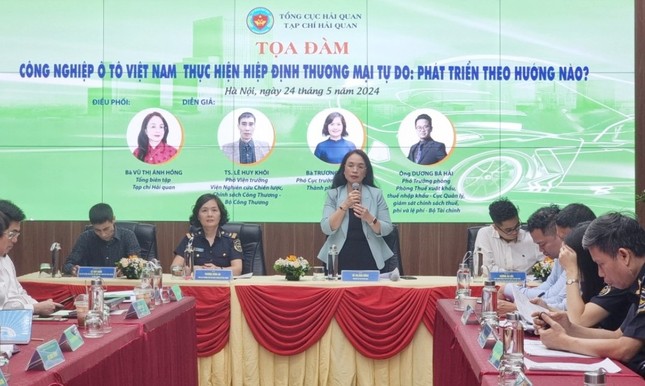The Vietnam Automobile Manufacturers’ Association (VAMA) shared insights at a seminar on “Vietnam’s Automotive Industry – Implementing Free Trade Agreements: Which Way to Go?” hosted by Hai Quan Magazine on the morning of May 24th.
At the seminar, Ms. Nguyen Anh Tuyet, Head of VAMA’s Customs Sub-committee, revealed that Vietnam has participated in and signed 16 free trade agreements (FTAs). Notably, many of these FTAs include commitments related to fully-built cars and a roadmap to reduce import taxes on fully-built vehicles to 0%.
A prime example is the ASEAN Trade in Goods Agreement (ATIGA), which reduced import taxes on cars to 0% in 2018. The UK/EVFTA (Vietnam-UK and Vietnam-Europe Free Trade Agreements) will follow suit, reaching 0% by 2028. Similarly, the Comprehensive and Progressive Agreement for Trans-Pacific Partnership (CPTPP) is on track to eliminate import taxes by 2027.
As Ms. Tuyet pointed out, immediately after the commitment to abolish import and export taxes within ASEAN countries, many domestically-produced products struggled to compete with those from Thailand and Indonesia and were subsequently replaced by imported goods.

Panelists sharing insights at the seminar.
With the implementation of the EVFTA commitments, import taxes on fully-built cars from the EU to Vietnam will decrease by approximately 6.4% annually for ten consecutive years. In 2024, the applicable import tax will be 38.1%. By 2030, it is expected that import taxes on fully-built cars from the EU will reach 0%.
Ms. Tuyet illustrated this point with an example: a typical car priced at $30,000 would, when imported to Vietnam in 2024, be subject to an import tax of 38.1%, equivalent to $11,430. This represents a reduction of $1,920 compared to the previous year. However, this tax amount could potentially decrease by tens of thousands of dollars for imported supercars.
“This indicates that more Vietnamese will have the opportunity to own vehicles ranging from mid-range to premium and even supercars from renowned brands such as Mercedes-Benz, BMW, Audi, Porsche, Ferrari, Lamborghini, and Bugatti,” VAMA representatives remarked.
Mr. Duong Ba Hai, Deputy Head of the Export Tax, Import Tax Department, Department of Policy Management, Supervision of Tax, Fees, and Charges, Ministry of Finance, acknowledged that participating in FTAs brings not only opportunities but also intensifies competitive pressure for Vietnamese automobile manufacturers.
He emphasized the need for careful and thorough consideration when formulating policies to promote the development of the automotive industry, particularly electric vehicles, in the coming years. This includes financial and investment policies, infrastructure development, and more.
According to Mr. Hai, several policies to support the domestic automotive industry are currently being implemented and will remain in effect until the end of 2027. Authorities should also conduct evaluations and make necessary adjustments to support local automobile businesses in the face of a potential influx of foreign cars into Vietnam.












